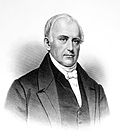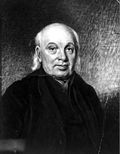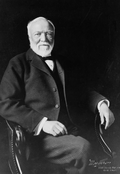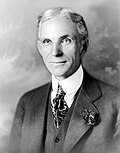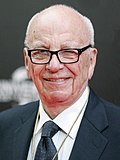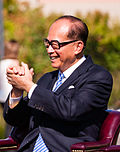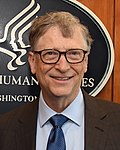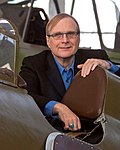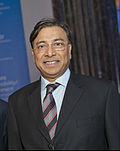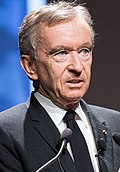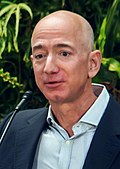Business magnate
This articleneeds additional citations forverification.(April 2023) |
Abusiness magnate,also known as anindustrialistortycoon,is a person who has achieved immense wealth through the creation or ownership of multiple lines ofenterprise.The term characteristically refers to a powerfulentrepreneurandinvestorwho controls, through personal enterprise ownership or a dominant shareholding position, a firm or industry whose goods or services are widely consumed. Such individuals have been known by different terms throughout history, such asrobber barons,captains of industry,moguls,oligarchs,plutocrats,ortai-pans.
Etymology and history[edit]
The termmagnatederives from theLatinwordmagnates(plural ofmagnas), meaning "great man" or "great nobleman".
The termmogulis an English corruption ofmughal,Persian or Arabic for "Mongol". It alludes to emperors of theMughal EmpireinEarly Modern India,who possessed great power and storied riches capable of producing wonders of opulence, such as theTaj Mahal.
The termtycoonderives from theJapanesewordtaikun(Đại quân),which means "great lord", used as a title for theshōgun.[1][2]The word entered the English language in 1857[3]with the return ofCommodore Perryto the United States. US PresidentAbraham Lincolnwas humorously referred to asthe Tycoonby his aidesJohn NicolayandJohn Hay.[4]The term spread to the business community, where it has been used ever since.
Usage[edit]
The examples and perspective in this articledeal primarily with the United States and do not represent aworldwide viewof the subject.(January 2024) |
Modern business magnates are entrepreneurs that amass on their own or wield substantial family fortunes in the process of building or running their own businesses. Some are widely known in connection with these entrepreneurial activities, others through highly-visible secondary pursuits such asphilanthropy,political fundraising and campaign financing, and sports team ownership or sponsorship.
The termsmogul,tycoon,andbaronwere often applied to late-19th- and early-20th-century North American business magnates inextractive industriessuch asmining,loggingandpetroleum,transportation fields such asshippingandrailroads,manufacturing such asautomakingandsteelmaking,inbanking,as well as newspaper publishing. Their dominance was known as theSecond Industrial Revolution,theGilded Age,or theRobber Baron Era.
Examples of business magnates in the western world include historical figures such as pottery entrepreneurJosiah Wedgwood,oilmenJohn D. RockefellerandFred C. Koch,automobile pioneerHenry Ford,aviation pioneerHoward Hughes,shipping and railroad veteransAristotle Onassis,Cornelius Vanderbilt,Leland Stanford,Jay GouldandJames J. Hill,steel innovatorAndrew Carnegie,newspaper publisherWilliam Randolph Hearst,poultry entrepreneurArthur Perdue,retail merchantSam Walton,and bankersJ. P. MorganandMayer Amschel Rothschild.Contemporary industrial tycoons include e-commerce entrepreneurJeff Bezos,investorWarren Buffett,computer programmersBill GatesandPaul Allen,technology innovatorSteve Jobs,vacuum cleaner retailer SirJames Dyson,media proprietorsSumner RedstoneandRupert Murdoch,industrial entrepreneurElon Musk,steel investorLakshmi Mittal,telecommunications investorCarlos Slim,Virgin Group founder SirRichard Branson,Formula 1 executiveBernie Ecclestone,and internet entrepreneursLarry PageandSergey Brin.
Business magnates[edit]
See also[edit]
- Bloomberg Billionaires Index
- Bourgeoisie
- Business oligarch
- Businessperson
- Chaebol
- Media proprietor
- Real estate investing
- Robber baron
- Software industry
- The World's Billionaires
- Russian oligarchs,the term for Russian business magnates
References[edit]
- ^Cummings, Donald Wayne (1988).American English Spelling: An Informal Description.JHU Press. p. 277.ISBN978-0-8018-3443-1.Retrieved22 May2012.
- ^"tycoon".Merriam-Webster.Retrieved22 May2012.
Origin of TYCOON Japanese taikun
- ^"tycoon".Merriam-Webster.Retrieved22 May2012.
First Known Use: 1857
- ^Goodheart, Adam (10 November 2010)."Return of the Samurai".The New York Times.Retrieved22 May2012.
External links[edit]
- Lewis, Mark (December 13, 2001)."The Famous 15: America's Most Fascinating Tycoons".Forbes.
- "25 Tycoons Who Run the World".Business Pundit. October 6, 2010.
- "Finlayson juhlii klassikkokuosien merkeissä".MTV3.fi - Koti(in Finnish). Bonnier AB. January 18, 2010. Archived fromthe originalon 2010-01-23.


